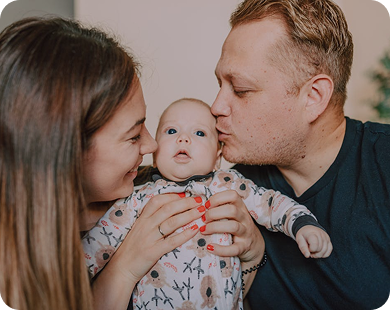Going through multiple IVF rounds can feel like an emotional rollercoaster, but you're not alone in this journey. With the right coping strategies, support systems, and mindset, you can maintain your emotional well-being while pursuing your dream of parenthood.
Understanding the Emotional Impact of Multiple IVF Cycles
When you're facing your second, third, or even fourth IVF cycle, it's completely normal to feel overwhelmed. Each cycle brings hope, anticipation, and sometimes disappointment. Research shows that women undergoing fertility treatments experience stress levels comparable to those facing serious medical conditions like cancer or heart disease (Domar et al., 2000).
The emotional challenges intensify with each cycle because you're not just dealing with the physical demands of treatment. You're also processing the grief of previous unsuccessful attempts while trying to maintain hope for the future. This emotional complexity requires specific strategies to help you navigate the journey with greater stability.
| Common Emotional Responses | Why They Occur | Normal Duration |
|---|---|---|
| Anxiety about outcomes | Uncertainty and lack of control | Throughout treatment cycle |
| Grief after failed cycles | Loss of expected pregnancy | 2-4 weeks post-cycle |
| Relationship strain | Stress and different coping styles | Variable, often cyclical |
| Social isolation | Difficulty relating to others | Can persist between cycles |
| Financial stress | Mounting treatment costs | Cumulative over time |
Building Your Emotional Foundation Before Each Cycle
Preparation is key to emotional stability. Before starting each new IVF round, take time to strengthen your emotional foundation. This isn't about guaranteeing success—it's about ensuring you have the tools to handle whatever comes your way.
Start by acknowledging your feelings about the previous cycle. If it wasn't successful, allow yourself to grieve. This isn't giving up; it's processing emotions in a healthy way. Many patients find it helpful to have a closure ritual between cycles, whether that's writing in a journal, having a meaningful conversation with your partner, or simply taking time to rest.
Consider working with a fertility counselor who specializes in reproductive psychology. These professionals understand the unique challenges of IVF and can provide targeted strategies for your situation. At Avida Fertility, we recognize the importance of emotional support and can connect you with qualified mental health professionals who work specifically with fertility patients.
Practical Strategies for Emotional Stability During Treatment
Managing your emotions during active treatment requires both daily practices and crisis management tools. The key is developing a toolkit of strategies you can use when emotions feel overwhelming.
| Strategy Type | Specific Techniques | When to Use | Expected Benefit |
|---|---|---|---|
| Mindfulness | Daily meditation, breathing exercises | Throughout cycle | Reduced anxiety, better sleep |
| Physical Activity | Gentle yoga, walking, swimming | During stimulation phase | Stress relief, mood improvement |
| Communication | Regular check-ins with partner | Weekly during treatment | Stronger relationship bond |
| Distraction | Hobbies, work projects, social activities | Waiting periods | Reduced rumination |
| Professional Support | Therapy sessions, support groups | As needed | Processing complex emotions |
One particularly effective technique is compartmentalization. This means setting specific times to think about your treatment and fertility concerns, rather than letting these thoughts consume your entire day. For example, you might allow yourself 30 minutes each evening to discuss treatment with your partner, then consciously shift focus to other activities.
Managing Expectations and Hope
Balancing hope with realistic expectations is one of the most challenging aspects of multiple IVF cycles. You need enough hope to continue treatment, but unrealistic expectations can lead to devastating disappointment.
Understanding real IVF success rates by age helps you maintain realistic expectations. Success rates vary significantly based on factors like age, diagnosis, and clinic protocols. At Avida Fertility, we believe in transparent communication about your individual chances of success based on your specific circumstances.
Consider reframing your definition of progress. Instead of measuring success only by pregnancy achievement, recognize other forms of progress: learning more about your body, ruling out certain causes of infertility, or developing stronger coping skills. This broader perspective can help maintain motivation even when cycles don't result in pregnancy.
The Two-Week Wait: Surviving the Most Challenging Phase
The period between embryo transfer and pregnancy test—known as the two-week wait—is often the most emotionally challenging part of IVF. During this time, you have no control over the outcome, which can trigger intense anxiety.
Develop a specific plan for the two-week wait before you enter it. This might include scheduling activities that require concentration, planning social engagements, or setting up regular check-ins with supportive friends or family members. Some patients find it helpful to understand post-embryo transfer symptoms to avoid over-analyzing every physical sensation.
| Week 1 Post-Transfer | Week 2 Pre-Test |
|---|---|
| Focus on gentle activities | Increase social engagement |
| Avoid pregnancy symptom searching | Prepare for both outcomes |
| Maintain normal routines | Plan post-test support |
| Practice relaxation techniques | Limit fertility forum reading |
Dealing with Failed Cycles: Processing Disappointment
When an IVF cycle doesn't result in pregnancy, the emotional impact can be profound. It's important to understand that grief after a failed cycle is normal and necessary. This grief isn't just about the cycle that didn't work—it's about the future you imagined that now feels further away.
Allow yourself time to process disappointment before making decisions about next steps. Research suggests that taking at least one month between cycles can improve both emotional well-being and treatment outcomes (Verberg et al., 2008). This break gives you time to recover physically and emotionally.
During this recovery period, consider what you learned from the cycle. Were there aspects of the protocol that could be adjusted? Did you discover new coping strategies that worked well? This reflection can help you feel more prepared and confident for the next attempt.
Strengthening Your Support Network
Your support network becomes increasingly important with each IVF cycle. However, the type of support you need may change over time. Early in your fertility journey, you might have appreciated well-meaning advice from friends and family. By your third or fourth cycle, you might prefer practical support over advice.
Be specific about what kind of support helps you most. Some people benefit from talking through their feelings, while others prefer distraction activities. Some want detailed updates from their support network, while others need space to process privately. Communicating these preferences clearly helps your loved ones provide the most effective support.
Consider joining online or in-person support groups specifically for people going through multiple IVF cycles. These groups understand the unique challenges you're facing and can provide both practical advice and emotional validation. Many patients find that connecting with others who truly understand their experience reduces feelings of isolation.
Maintaining Your Relationship During Multiple Cycles
Multiple IVF cycles can strain even the strongest relationships. Partners often cope differently with stress, which can create misunderstandings and conflict. One partner might want to talk constantly about treatment, while the other prefers to focus on other aspects of life.
Schedule regular relationship check-ins that aren't focused on fertility treatment. This gives you both space to connect as a couple beyond your shared goal of parenthood. Many couples find that setting boundaries around fertility discussions—such as agreeing not to talk about treatment during meals or before bed—helps maintain relationship balance.
| Communication Strategy | How to Implement | Benefits |
|---|---|---|
| Weekly relationship meetings | 30 minutes to discuss feelings and concerns | Prevents buildup of resentment |
| Fertility-free zones | Designated times/places where treatment isn't discussed | Maintains relationship identity beyond fertility |
| Individual coping time | Each partner has solo activities for stress relief | Prevents emotional burnout |
| Shared non-fertility goals | Plan activities or projects unrelated to treatment | Strengthens partnership bond |
Financial Stress and Emotional Impact
The financial burden of multiple IVF cycles can significantly impact emotional well-being. As costs accumulate, you might feel pressure to succeed quickly or worry about how many more attempts you can afford. This financial stress can compound the emotional challenges of treatment.
Create a realistic financial plan that includes multiple cycle scenarios. Understanding IVF treatment costs in Mexico for 2025 can help you make informed decisions about treatment options. Some patients find it helpful to set a financial limit in advance, which can actually reduce anxiety by providing clear boundaries.
Consider exploring all available financial options, including insurance coverage, financing programs, and treatment abroad. At Avida Fertility in Mexico, we offer high-quality treatment at more accessible price points, which can reduce financial stress while maintaining excellent care standards.
When to Consider Alternative Approaches
After multiple IVF cycles, you might need to consider alternative approaches to building your family. This doesn't mean giving up—it means expanding your definition of success. Options might include IVF with donor eggs, exploring different treatment protocols, or considering other paths to parenthood.
Some patients benefit from taking an extended break from treatment to focus on other life goals. This break can provide perspective and renewed energy for future attempts. Others find that switching clinics or trying different treatment approaches reinvigorates their hope and motivation.
The key is making these decisions from a place of empowerment rather than desperation. Take time to evaluate your options thoroughly, and don't hesitate to seek second opinions or additional consultations to ensure you're making informed choices.
Professional Mental Health Support
Professional mental health support becomes increasingly important with multiple IVF cycles. A fertility counselor can help you develop personalized coping strategies, process complex emotions, and make difficult decisions about treatment continuation.
Look for mental health professionals who specialize in reproductive psychology. These specialists understand the unique challenges of fertility treatment and can provide targeted interventions. Some therapeutic approaches particularly helpful for fertility patients include cognitive-behavioral therapy, mindfulness-based stress reduction, and acceptance and commitment therapy.
Don't wait until you're in crisis to seek professional support. Many patients benefit from starting counseling early in their fertility journey, which provides tools and strategies before emotions become overwhelming.
Frequently Asked Questions
How many IVF cycles should I try before considering other options?
There's no universal answer to this question. Factors to consider include your age, diagnosis, response to previous treatments, financial resources, and emotional well-being. Most fertility specialists recommend evaluating your situation after three unsuccessful cycles, but this varies based on individual circumstances. Learn more about how many retrievals might be needed for a baby.
Is it normal to feel less hopeful with each cycle?
Yes, it's completely normal for hope to fluctuate throughout multiple cycles. Many patients experience decreased optimism after failed attempts, which is a natural protective mechanism. The key is finding ways to maintain enough hope to continue treatment while protecting yourself from devastating disappointment.
How can I support my partner who's struggling emotionally?
The best support often involves listening without trying to fix or minimize their feelings. Ask specifically what kind of support they need—sometimes it's practical help, sometimes it's emotional validation, and sometimes it's space to process independently. Consider couples counseling if you're struggling to support each other effectively.
Should I tell people about multiple failed cycles?
This is a personal decision that depends on your comfort level and support needs. Some people find that sharing their struggles reduces isolation and increases support. Others prefer privacy to avoid unwanted advice or questions. You can also choose to share with some people but not others, or to share general information without specific details.
How do I know if I need professional mental health support?
Consider professional support if you're experiencing persistent sadness, anxiety that interferes with daily activities, relationship problems, sleep disturbances, or thoughts of self-harm. However, you don't need to wait for severe symptoms—many patients benefit from preventive mental health support throughout their fertility journey.
Can stress from multiple cycles affect treatment success?
While research on stress and IVF outcomes shows mixed results, chronic stress can affect overall health and well-being. Managing stress through healthy coping strategies is beneficial regardless of its direct impact on treatment success. Focus on stress management for your overall quality of life rather than as a way to improve IVF outcomes.
Moving Forward with Confidence
Maintaining emotional stability through multiple IVF rounds requires intentional effort, but it's absolutely achievable. Remember that seeking support—whether from mental health professionals, support groups, or trusted friends and family—is a sign of strength, not weakness.
Your fertility journey is unique, and there's no right or wrong way to navigate the emotional challenges. What matters most is finding strategies that work for you and adjusting them as needed throughout your treatment process.
Consider exploring additional resources about how to cope with infertility emotionally and strategies after failed IVF to further support your emotional well-being throughout treatment.
Remember that taking care of your emotional health isn't separate from your fertility treatment—it's an integral part of your overall care. By prioritizing your mental well-being, you're giving yourself the best possible foundation for whatever comes next in your fertility journey.
Considering IVF treatment? Avida Fertility is here to support and guide you on your fertility journey. Reach out today for a personalized consultation and take the first step towards building your family with confidence.






.png)







.svg)
.svg)
